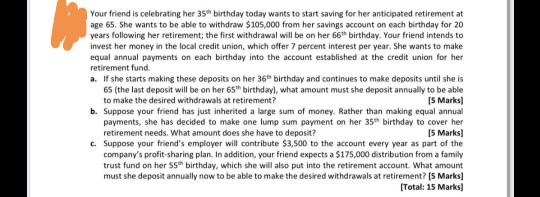Question
Please answer a, b and c. Your friend is celebrating her 35th birthday today wants to start saving for her anticipated retirement at age 65.

Please answer a, b and c.
Your friend is celebrating her 35th birthday today wants to start saving for her anticipated retirement at age 65. She wants to be able to withdraw $105,000 from her savings account on each birthday for 20 years following her retirement; the first withdrawal will be on her 66th birthday. Your friend intends to invest her money in the local credit union, which offer 7 percent interest per year. She wants to make equal annual payments on each birthday into the account established at the credit union for her retirement fund.
a. If she starts making these deposits on her 36th birthday and continues to make deposits until she is 65 (the last deposit will be on her 65th birthday), what amount most she deposit annually to be able to make the desired withdrawals at retirement?
b. Suppose your friend has just inherited a large sum of money. Rather than making equal annual payments1, she has decided to make one lump sum payment on her 35th birthday to cover her retirement needs. What amount does she have to deposit?
c. Suppose your friend's employer will contribute $3,500 to the account every year as part of the company's profit-sharing plan. In addition, your friend expects a $175,000 distribution from a family trust fund on her 55th birthday, which she will also put into the retirement account. What amount most she deposit annually now to be able to make the desired withdrawals at retirement?
Your friend is celebrating her 35 birthday today wants to start saving for her anticipated retirement at age 65. She wants to be able to withdraw $105.000 from her savings account on each birthday for 20 years following her retirement, the first withdrawal will be on her 66 birthday. Your friend intends to invest her money in the local credit union, which offer 7 percent interest per year. She wants to make equal annual payments on each birthday into the account established at the credit union for her retirement fund. a. if she starts making these deposits on her 36 birthday and continues to make deposits until she is 65 (the last deposit will be on her 65th birthday], what amount must she deposit annually to be able to make the desired withdrawals at retirement? [ Marks! b. Suppose your friend has just inherited a large sum of money. Rather than making equal annual payments, she has decided to make one lump sum payment on her 35 birthday to cover her retirement needs. What amount does she have to deposit? IS Marks] 6. Suppose your friend's employer will contribute $3,500 to the account every year as part of the company's profit sharing plan. In addition, your friend expects a $175,000 distribution from a family trust fund on her 55 birthday, which she will also put into the retirement account. What amount must she deposit annually now to be able to make the desired withdrawals at retirement? | Marks [Total: 15 MarksStep by Step Solution
There are 3 Steps involved in it
Step: 1

Get Instant Access to Expert-Tailored Solutions
See step-by-step solutions with expert insights and AI powered tools for academic success
Step: 2

Step: 3

Ace Your Homework with AI
Get the answers you need in no time with our AI-driven, step-by-step assistance
Get Started


